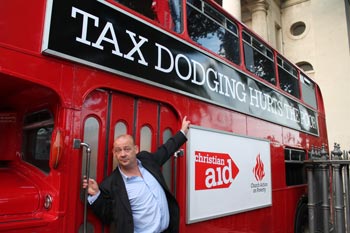'Tax dodgers should be shamed' - Peter Oborne
Political commentator and Daily Telegraph journalist Peter Oborne called for tax dodgers to be named and shamed at a Christian Aid-organised debate on the morality of tax dodging

Last Thursday's discussion at Christ Church Spitalfields, chaired by Canon Giles Fraser (pictured), saw the former political editor of the Spectator sparring with panelists including Dr Richard Wellings from the right-wing think tank the Institute of Economic Affairs.
Mr Oborne said, 'People and companies who don't pay tax should be shamed. I believe as citizens and as political beings on the left or the right that we have a duty to shame companies that don't pay their taxes, that don't fulfill their civic duties.'The event was part of the Tax Justice Bus tour, a campaign by Christian Aid and Church Action on Poverty which aims to bring the message of tax justice to the UK, with a 53 day tour of the country in a double-decker red bus.
Mr Oborne added, 'I think there is a very strong moral case for paying tax from a conservative point of view which is why I strongly support this campaign. I absolutely believe that we belong to a community. We're all in this together, as the Prime Minister has said.
'We have an interest in the welfare of our fellow citizens. Just from a nakedly capitalist point of view, you want well trained employees that have received a good education, a good transport system and health services.'
Dr Wellings argued that governments were corrupt and so it should be celebrated that they aren't able to collect the taxes they are due.
He said, 'In many ways it's probably a good thing that the Zambian Government and many other African governments don't have much money to spend. Let's face it, it's the government we're talking about here, not the people, and most of these governments are hugely corrupt.'
But Savior Mwamba, Director of the Centre for Trade Policy and Development in Zambia, said this was an old fashioned approach which was out of touch with reality.
He said, 'We see this Western stereotypical view that doesn't understand the realities. The reality is that when Zambia's annual budget share from taxes increased we immediately saw an increase in education spending.
'So I don't know what kind of theory he is talking about but what I see in reality is definitely that tax revenue has a role in uplifting people's welfare.'
He added, 'The Government of Zambia raises more tax from individual citizens like me than through corporations because even if we wanted to, we wouldn't have the means to do it. We're not asking companies to pay more than they should, we're just asking them to pay what they're supposed to pay.'
Christian Aid research estimates that tax dodging by unscrupulous corporations costs developing countries $160 billion a year, more than the entire global aid budget. In the UK, Government estimates put the figure at £35 billion, money which could be spent on public services and helping people out of poverty.
Dr Sabina Alkire, Director of the Oxford Poverty and Human Development Institute, said the important thing was to bring about a culture change so that tax dodging became unacceptable.
She said, 'The key point to shaming people is to change the culture.
'What's interesting is that currently corporate social responsibility doesn't include the expectation of tax paying and so it's important to bring that in to the ethos so that is part of the definition. That's the kind of change that needs to happen and that hopefully movements like this will ignite.'
The Tax Justice Bus tour continues on its journey around the UK. To learn more and sign the petition urging David Cameron to tackle the problem of tax dodging, visit
www.christian-aid.org.uk/taxbus.